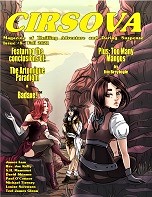“The Artomique Paradigm (Part 3 of 3)” by Michael Tierney (serial, not reviewed)
“Too Many Mangos” by Jim Breyfogle
“The Black Skull” by Rev. Joe Kelly
“We Have Always Been Beasts” by S.H. Mansouri
“Dead Neighbor” by David Skinner
“The Light of Reason” by Teel James Glenn
“Locker No. 249” by James Lam
“Remorsels” by Louise Sorensen
Reviewed by Victoria Silverwolf
In addition to the conclusion of a serialized novel and seven new works of short fiction, this issue also contains a reprinted tale in comic book form.
The title of “Too Many Mangos” by Jim Breyfogle does not refer to tropical fruit, but to the name of one of the two protagonists. On a journey to the far north in order to obtain a magic object for a wizard, he is separated from his companion, and replaced by an exact duplicate. He must battle extreme cold in order to rejoin his partner and defeat the double.
This sword-and-sorcery adventure is typical of its kind, with plenty of wicked enemies to face in battle and sinister enchantments. Fans of the genre should be pleased, and the sense of cold is vividly conveyed.
“The Black Skull” by Rev. Joe Kelly is a tale of dark fantasy set in an imaginary version of medieval Europe. An abbot obtains the title object from a Viking, unaware of its powers. A pair of wandering adventurers become involved with the thing’s evil magic, leading to much bloodshed.
This story is most notable for its extreme violence. The reader is likely to lose count of the number of people killed in gruesome ways. It is likely to appeal most to readers of horror fiction.
“We Have Always Been Beasts” by S.H. Mansouri is a strange story of boys who age prematurely and die at an early age because of the constant rain that falls on them. They are all the sons of a man who forces them away from their mothers when they are weaned. A trio of the boys plan to kill the man, only to be caught and forced out into the wilderness, where exiles become animals.
This synopsis only gives a hint of the bizarre nature of the plot. One boy’s desire to know which of the women in the man’s harem is his mother adds a touch of poignancy. The author shows great originality, but the story may confuse some readers.
“Dead Neighbor” by David Skinner is a very short account of a man who uses a weird invention to determine that a murder has taken place in the house next door. His investigation leads to an unexpected discovery.
Written in a jumpy, eccentric style, full of very short sentences, this tiny mixture of science fiction and crime fiction holds one’s attention for its brief length. The protagonist’s device is so odd that it is difficult to understand how it works. Readers may be able to predict the surprise ending.
In “The Light of Reason” by Teel James Glenn, two Victorian occult investigators track a vampire to New Orleans. They risk their lives confronting the monster directly, but they have a trick up their sleeves.
This old-fashioned tale will be appreciated by those who have memories of pulp adventures. The plot twist that ends the story may seem familiar to those who have read many vampire stories.
Only two pages long, “Locker No. 249” by James Lam takes the form of a high school student relating a strange story to the teenager’s mother. It seems that an ancient Chinese mummy was placed in a school locker many years ago, with consequences for the present.
The climax of this little chiller reveals the narrator’s involvement. There is not much to this bit of flash fiction other than its plot, which should please those in search of a frisson of fear.
The narrator of “Remorsels” by Louise Sorensen sees pet animals appear in altered forms in a painting after they die. Even more alarming is the fact that other transformed animals show up in the picture when the narrator eats meat purchased from a strange butcher shop. One particularly eerie manifestation causes the narrator to go on a vegan diet, but this does not prevent the final supernatural event.
This is an unusual mixture of fantasy, ghost story, horror, and the subgenre of Weird Little Shop fiction. The many peculiar happenings hold the reader’s attention, even if it’s not always clear what the author is trying to say about the relationship between people and animals.
Victoria Silverwolf ate some dried mangos tonight; probably too many.
 Cirsova
Cirsova